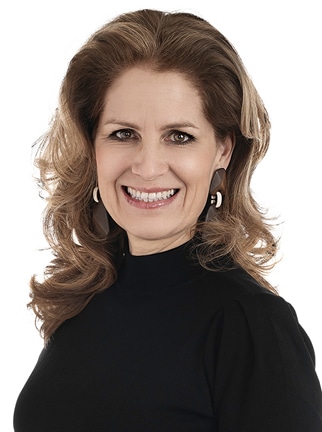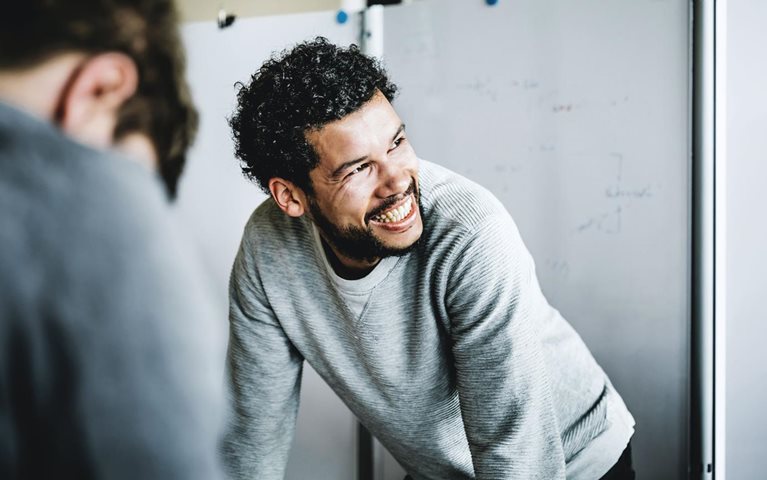When Jacqueline Brassey joined McKinsey in 2013 as an organizational expert, she had 15 years of professional experience as an academic and a leader at Unilever. She was very excited about her career move, but things didn’t go as planned. “Somewhere in my second year, I had a confidence crisis,” she explains. “I had started a different role in a new environment and my inner voice kept telling me I wasn’t good enough; I was out of my comfort zone.”

Jacqueline had always experienced low-grade anxiety but now it reached a new level. “I would freeze in meetings, work harder and harder to compensate, and ultimately began having secret panic attacks,” she recalls. “Finally, there came a moment when I said: ‘Enough! I cannot hide this. I’m going to talk about it.’”
So she did talk to colleagues and friends. Reactions ranged from “Thank goodness someone is finally acknowledging this; we all are secretly struggling” to “Don’t talk too much about this; it’s best to keep it private.” But she kept on sharing her experiences, started researching the topic, and pursued an additional medical degree in affective neuroscience.
In 2015, she partnered with Nick Van Dam, a professor at the University of Pennsylvania and IE University who led learning at McKinsey and is now a senior advisor to the firm, and Arjen van Witteloostuijn, dean of the School of Business and Economics of Vrije Universiteit Amsterdam, to write a book called Advancing Authentic Confidence through Emotional Flexibility. A second updated English edition will be published in September 2022.
Today, Jacqueline is McKinsey’s chief scientist and director of research science for our People & Organizational Performance Practice and a co-leader at the McKinsey Health Institute.

What exactly is authentic confidence? “It means you can face challenges because you know you have the skills to handle them. You are clear-eyed about your weaknesses and accept them; you know your purpose in life which guides your personal growth,” explains Jacqueline. “You are also comfortable with the uncertainty of meeting new situations.”
When you lack authentic confidence, you let self-doubt and anxiety distract you from pursuing what matters to you. And for some people, a lack of authentic confidence can show up as over-confidence, arrogance and over-estimating true capabilities.
Nick van Dam adds: “In order to remain employable, every person needs to upskill or reskill themselves. People only learn when they do things that they have never done before and move outside of their ‘comfort zone’ into their ‘learning zone.’ This is where the magic happens from a development perspective, and the confidence comes in.”
From a company’s perspective, employees who are not developing themselves can hinder an organization from advancing the people capabilities they need to execute their business strategy.
The book is based on acceptance and commitment training, a cognitive behavior therapy founded by Steven Hayes and others, translated to the context of work. The authors explain how anxiety and stress manifest in the brain and body and influence behavior and experience. It includes insights from neuroscience and organizational behavior; a playbook with 32 on-the-spot tools; and personal stories to bring the concepts to life.
For example, in the face of stressful situations, the book helps readers learn how to utilize special breathing, voice, and defusion techniques. One chapter in particular is devoted to the cultivation of specific skills in support of ongoing self-development, including tactics for leading and navigating difficult conversations.
The anxiety and stress experience which Jacqui describes in her book can lead to reduced work performance and even to burnout. A recent study by the McKinsey Health Institute, Addressing employee burnout: are you solving the right problem?, found that one in four employees report experiencing burnout symptoms.
The report outlines the workplace factors that influence employee mental health, and identifies toxic workplace behavior—interpersonal actions that make people feel excluded, belittled and unsafe, which many organizations don’t recognize—as the single biggest predictor in employee burnout. Another factor has to do with leadership—the stress and toxic behavior of leaders is often cascaded through the hierarchy in organizations.
Here’s where Authentic Confidence can help. If leaders and employees learn how to better regulate anxiety and stress, manage their emotions, and develop the courage to make choices that support their values, they can “buffer” or moderate difficult workplaces.
However, these are the very same employees—emotionally resilient, confident, effective—who are 60 percent more likely to leave an unhealthy organization.
“Clearly any business needs to address both individual employee resilience and the broader workplace factors that cause burnout,” says Jacqueline, “or risk losing some of their most resilient, adaptable employees.”

